



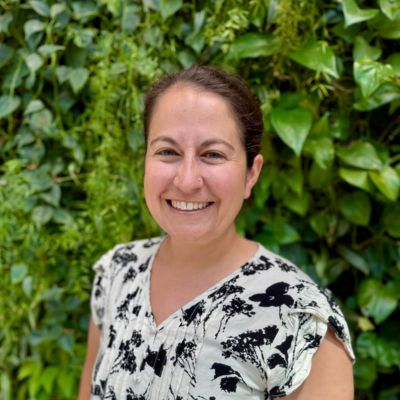
Favorite native plant or animal: Manzanitas
Favorite thing to do around the Bay Area: Biking in the East Bay and exploring new hiking trails in the regional parks.
Superpower: The power of foresight – to see the results of decisions before they are made, and then course correct!
Sarah is the founder and principal consultant at Sarah Diringer Consulting, where she supports non-profits, philanthropies, and mission-driven businesses through research and organizational strategy, with a focus on climate and water.
Before founding Sarah Diringer Consulting, Sarah served as Program Officer for Water and Climate at the Pisces Foundation, where she led strategy and grantmaking initiatives to support sustainable urban water systems and mitigate climate change for the communities most impacted. Prior to that, as a Senior Researcher at the Pacific Institute, she led research and outreach efforts to integrate community-driven, multi-benefit solutions into water policy.
Sarah earned a Ph.D. in Civil and Environmental Engineering from Duke University, where she focused on the impacts of gold mining and river pollution in Peru. She also holds a B.S. in Environmental Science from UCLA. In her free time, Sarah loves hiking and biking throughout the East Bay with her family and playing trombone in local community bands!

Favorite native plant or animal:
The grey fox. We have a family of them that lives on our property in Monte Rio, and they make me so happy.
Favorite thing to do around the Bay Area:
Hike the SF Crosstown Trail from Candlestick Point to Point Lobos. I love walking across the city and appreciating the natural beauty and vibrancy of San Francisco. I am also an avid stand-up paddle boarder all around the Bay.
Superpower:
I wish I could instantly provide free high-quality healthcare to everyone with a wave of my magic wand.
Cindy is the Executive Director of Health Outreach Partners, where she has led the organization since November 2019, bringing more than 30 years of public health and nonprofit leadership experience. Before joining HOP, she spent many years at Planned Parenthood Northern California, most recently serving as Senior Regional Director for the Contra Costa and San Francisco health centers.
A lifelong Bay Area native from San Francisco, Cindy draws inspiration from the region’s landscapes and communities. She loves hiking, especially the San Francisco Crosstown Trail, paddleboarding on the Bay near McCovey Cove, and spending time with her two sons. She also enjoys live music and cheering on the San Francisco Giants.

Favorite native plant or animal: Hummingbirds
Favorite thing to do around the Bay Area: I love going to new hiking spots around the Bay Area.
Superpower: Photographic Memory
Andy Briseño (he/him, they/them) is passionate about advocating for the rights of historically marginalized individuals. Andy has a strong background in nonprofit communications and digital marketing. Andy is proud to have been born and raised in the Oakland and is eager to work towards preserving San Francisco Bay. Andy holds a Bachelors in Ethnic Studies and a double minor in Latin American Studies and LGBTQIA+ Studies. Outside of work Andy enjoys playing in recreational sports leagues, watching movies, going to art galleries/museums, and being in nature.

Alex is a partner at TPG Rise Climate, the climate investing platform of TPG, where he leads private equity investments in businesses focused on industrial decarbonization, energy transition, and climate adaptation and resilience.
As a lifelong San Franciscan, he is dedicated to preserving the natural beauty of the San Francisco Bay and its surrounding areas.

Favorite native plant or animal: California Poppy
Favorite thing to do around the Bay Area: Walking in the Presidio, spending time by the water, and catching San Francisco Giants games
Superpower: Having difficult but productive conversations
Carmela moved to San Francisco right after college and has called it home ever since. She is drawn to its diversity – of people, places, and the stunning natural beauty of the Bay Area.
An HR professional, she has spent most of her career working with startups and growing businesses. In 2017, she founded a human resources consulting firm, where she often applies her superpower: having difficult yet productive conversations that others tend to avoid.

Favorite native plant or animal: Red-tailed hawk
Favorite thing to do around the Bay Area: Night hiking when there’s a meteor shower or a comet in the sky
Superpower: The ability to shape-shift, so that I could soar like an eagle and dive like a Cuvier’s beaked whale
Joy Leilei Shih-Casado is an ocean conservationist with a PhD in Oceanography from the University of Hawaiʻi at Mānoa, a masters in Marine Biodiversity and Conservation from Scripps Institution of Oceanography, and a bachelor’s in Astrophysics from UC Berkeley. Her research has focused on coral reefs in French Polynesia, Hawaiʻi, and the Florida Keys, as well as invasive species, symbionts, and microbial nutrient cycling.
She works actively on plastic pollution policy at the local, state, and national levels. She has served on the Executive Committees of the Surfrider Foundation and the Sierra Club in both California and Hawaii and currently chairs the Sierra Club National Marine Team. A master, resuce, and scientific diver, Joy enjoys freediving and hiking with her three dogs and family in her free time.

Favorite native plant or animal: Valley Oak – it reflects an essential character of the Bay Area and provides me peace and inspiration
Favorite thing to do around the Bay Area: Biking and hiking along the waterfront
Superpower: Maintaining perspective and staying positive
Diane is a Bay Area native with a career in urban environmental planning and stewardship for the City and Port of San Francisco. As the former Planning and Environment Director at the Port, she led community initiatives to develop the Port’s Waterfront Master Plan, along with diverse shoreline public access, and park and development projects serving San Francisco and the Bay Area.
Passionate about fostering genuine community connections, Diane believes in learning together – especially in the age of climate change – to ensure the San Francisco Bay waterfront remains an invaluable public and environmental resource for all.

Favorite native plant or animal: California Coyote – every time I encounter one, whether on the streets of San Francisco or in the Baylands, I’m in awe of their beauty and how unfazed they seem in their environment
Favorite thing to do around the Bay Area: I love exploring new trails with my family and revisiting favorites, like Russian Ridge when the wildflowers bloom or hiking the scenic route from Muir Woods to Stinson Beach on a warm day
Superpower: Teleportation – the ability to travel anywhere instantly and bring others along, saving time and reducing my carbon footprint
Christiana is a Business Performance Advisor at Insperity, where she partners with small and medium-sized businesses to deliver strategic HR solutions that drive growth and operational excellence. With over a decade of experience in business development and fundraising, she has cultivated high-impact partnerships with Fortune 100 companies, led innovative revenue strategies, and raised millions to support nonprofit initiatives advancing equity and inclusion.
A Bay Area native and passionate hiker, Christiana has a deep love for the outdoors and is committed to preserving the region’s unique ecosystems and natural resources that have shaped her connection to the environment.

Favorite native plant or animal: Volunteer scrub oak – years ago, one took root in our front yard, and it has been slowly growing into a majestic guardian of our home.
Favorite thing to do in the Bay Area: Biking around Marin with my daughter in tow, discovering new routes and favorite spots.
Superpower: The ability to stop time – to learn, explore, and do all the things I’m curious about
Adrienne Donley serves as Vice President of People and Culture at Unicycive, bringing over 20 years of experience supporting life sciences companies in developing solutions that improve patients’ lives. She has led efforts to build high-performing teams and organizations, holding leadership roles at Genentech, Abbott Labs, VeriSign, K2, and Intelligence Technologies. Her work focuses on scaling organizations, fostering adaptability, and enhancing team effectiveness.
A Bay Area native, Adrienne has a lifelong passion for the outdoors and enjoys hiking the hills of Marin County with her husband and daughter. She is deeply committed to advancing scalable climate adaptation solutions and is honored to support Save The Bay’s mission.
Cities should create storm drain master plans that identify areas at risk of flooding due to current and future storms and identify projects to ensure the storm drain system has the capacity to function under future conditions. Identified projects should be prioritized based on future flood risk, water quality, and benefits to disadvantaged communities. As much as possible, the city should identify green stormwater infrastructure solutions to drainage issues; this could take the form of a green streets master plan.
Pacifica
Pacifica’s Storm Drain Master Plan identifies capacity deficiencies in the storm drainage system, develops feasible alternatives to correct these deficiencies, and plans the infrastructure that will serve future development. It includes an analysis of future precipitation impacts on the storm drain system.
San Mateo County
The San Mateo Countywide Green Streets Master Plan identifies “how and where to build sustainable streets in San Mateo County that integrate stormwater management with local priorities, like bike and pedestrian mobility, transit improvements, climate change adaptation, and more.” It includes an analysis of stormwater runoff under future climate scenarios, which determined that the planned green street projects could offset the projected roadway runoff due to climate change for a 2-year storm. Additionally, the green streets projects were prioritized based on water quality, flood risk, water supply, climate change impacts, groundwater constraints, utility constraints, vulnerable community indicators, vehicle ownership statistics, urban canopy, and urban heat island effect.
Local jurisdictions must ensure that public infrastructure (such as parks, streets, sewers, stormwater infrastructure, and shoreline infrastructure) are designed for flood resilience and incorporate nature-based solutions wherever possible. They can do this by creating capital improvement planning processes to ensure all proposed projects are evaluated for flood resilience and green infrastructure potential.
Burlingame
Burlingame has a green infrastructure checklist used to evaluate opportunities to include green stormwater infrastructure (GSI) features in capital projects. This approach ensures that no opportunities for GSI are missed. It can be found in Appendix B of the city’s Green Infrastructure Plan.
San Francisco
San Francisco has a “Guidance for Incorporating Sea Level Rise into Capital Planning in San Francisco Sea Level Rise Checklist”. Using this checklist ensures that all capital projects planned in the sea level rise vulnerability zone are resilient to sea level rise.
With the passage of SB 272 (Laird, 2014), Bay Area cities are required to create Shoreline Resilience Adaptation Plans (RSAPs) and have those plans approved by the Bay Conservation and Development Commission (BCDC) by 2034. BCDC has released draft RSAP guidelines which cities must follow when creating their shoreline plans. The guidelines will be finalized at the end of 2024. We hope to see the final guidelines reinforce an emphasis on nature-based solutions, public access, and community engagement.
Hayward
The Hayward Regional Shoreline Adaptation Master Plan (HRSAP) was created in 2021 to establish a vision and adaptation strategies for protecting natural and built shoreline assets from sea level rise. It recommends shoreline resilience projects such as horizontal levees, gently sloping vegetated buffers that provide sea level rise protection and water quality benefits. The HRSAP was created by a joint powers authority consisting of the City, the Hayward Area Park and Recreation District (HARD), and the East Bay Regional Park District.
Sea level rise and groundwater rise overlay districts map out which geographical areas will be affected by flooding under future climate conditions and apply specific development requirements or restrictions on those areas. Overlay districts can be created through a zoning code update and are a key step in ensuring that flood-resilient development conditions are implemented and enforced. OneShoreline’s Planning Policy Guidance provides template language for creating Sea Level Rise and Groundwater Rise Overlay Districts.
Burlingame
In 2021, Burlingame updated its zoning ordinance to include regulations for the Bayfront Commercial District, including guidelines for new development to be resilient to sea level rise. Section 25.12.050 outlines public access, flood, and sea level rise performance guidelines for new developments. It adopts Burlingame’s Map of Future Conditions, including a Sea Level Rise Overlay District, which is based on the Our Coast Our Future hazard map.
South San Francisco
In 2022, South San Francisco (SSF) updated its zoning code to include a Flood Plain/Sea Level Rise overlay district. The overlay district includes areas that will flood under a 36-inch sea level rise scenario and a 100-year storm. It imposes new construction requirements including base flood elevations sufficient to protect against the FEMA 100-year event with 3 feet of sea level rise, nature-based stormwater infrastructure designed to function under future conditions, and a bay access buffer within 100 ft from the shoreline.
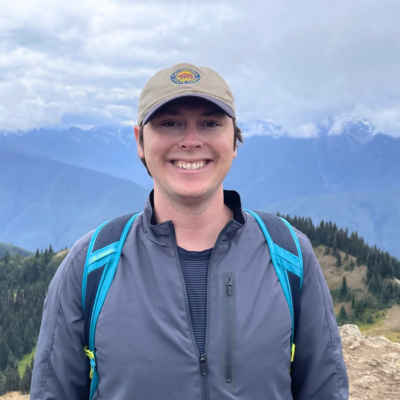
Favorite native plant or animal: Coast live oak (Quercus agrifolia)
Favorite thing to do around the Bay Area: Exploring new hiking trails or enjoying a round of disc golf
Superpower: Shapeshifting – Who wouldn’t want to see the world from the perspective of a grey whale one day, and then from a red-tailed hawk the next?
Reed is thrilled to join Save The Bay as Individual Giving Officer, bringing years of experience advancing and building support for mission-based causes. His professional history includes work in political fundraising, environmental policy, campaigning, and most recently in pollinator advocacy. Reed fostered his love of nature and California’s native ecosystems hiking around the hills of northern San Diego County and spending time in his grandparent’s garden. His passion for environmental protection took him to UC Berkeley’s College of Natural Resources, where he earned degrees in Society & Environment and Geography. Reed is humbled and excited to serve Bay Area communities and wildlife through his work with Save The Bay.
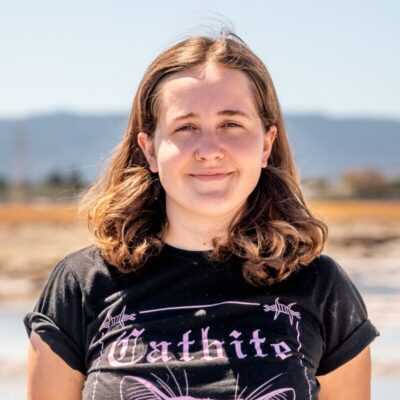
Favorite native plant or animal: California giant salamander
Favorite thing to do around the Bay Area: Exploring my neighborhood on my bike
Superpower: Breathing underwater
Mimi (she/her) grew up in Seattle, Washington before attending Mills College, where she studied Biology with a concentration in Ecology, Evolution and Behavior. She has spent time in outdoor education teaching students at San Mateo Outdoor Education, as well as in restoration serving on a Washington Conservation Corps crew restoring salmon habitat. She has also dabbled in organic farming and animal behavior research and she is passionate about preserving ecosystems and building climate resilience.
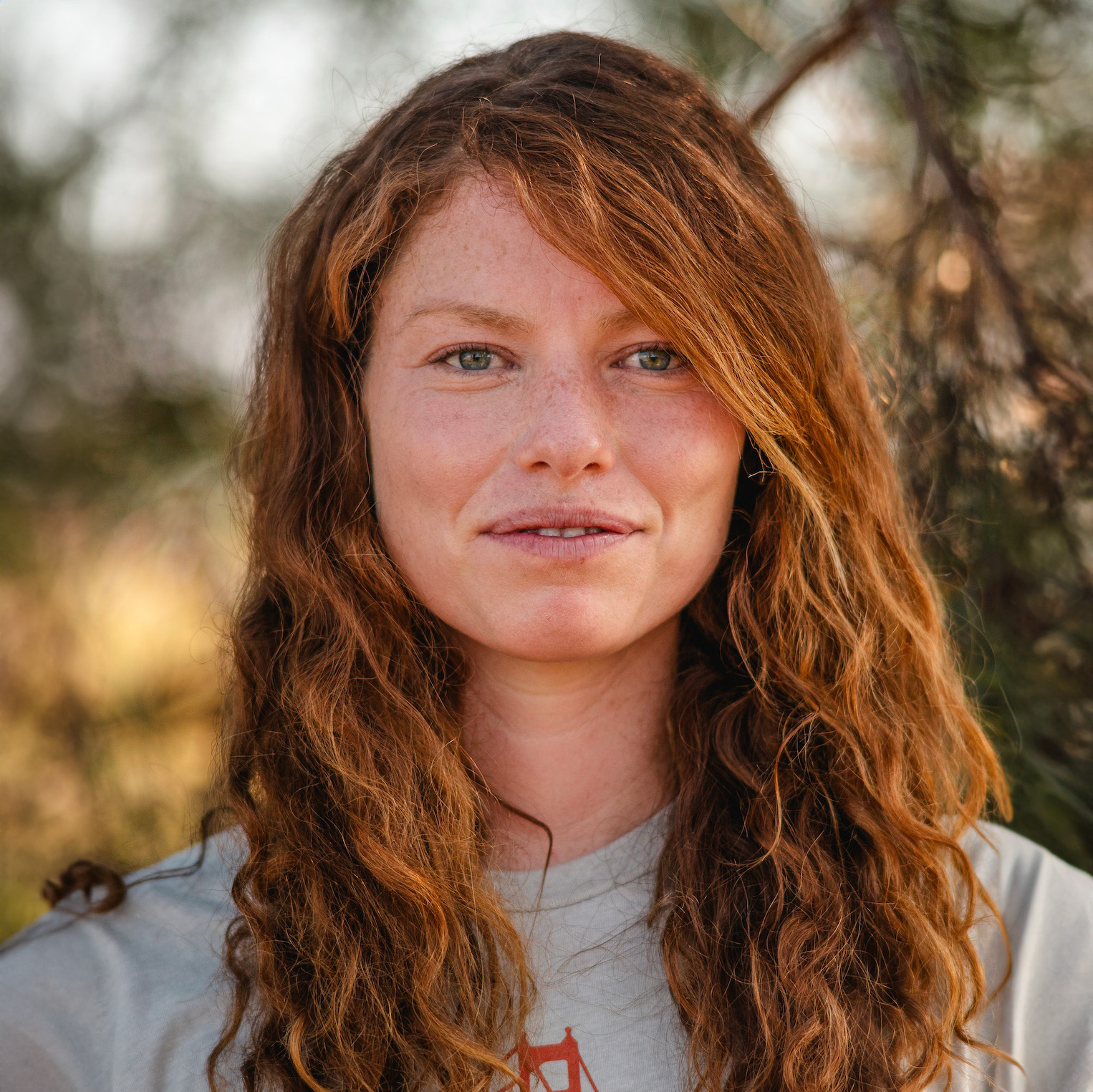
Favorite native plant or animal: Bull kelp
Favorite thing to do around the Bay Area: Swimming or surfing along the shoreline
Superpower: Ability to nap the moment she finds a sunbeam
Laura studied sea level rise at the Scripps Institution of Oceanography and has been working in climate resilience and water management for ten years.
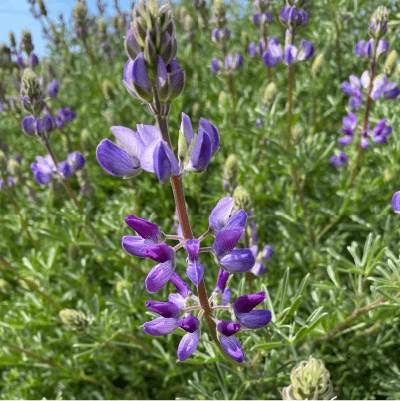
Favorite native plant or animal: Poppies!
Favorite thing to do around the Bay Area: Watch the sunset from the Berkeley hills
Superpower: Speak every language (animal and human)
AmyBeth (she/her) is a Political Organizer at Save the Bay, where she focuses on nurturing partnerships with coalitions and community organizations working on green stormwater infrastructure, affordable housing, and toxic sites impacted by sea level and groundwater rise. Her background is in faith-based organizing for immigrant rights alongside undocumented communities in Southern Arizona. She believes undoing oppressive systems requires all of us, and that we must prioritize the concerns of marginalized communities at the front lines of environmental issues. In her free time, she loves to sing, hike, and hang out with her cat Rosy.

Favorite native plant or animal: Redwood trees
Favorite thing to do around the Bay Area: Swimming in Aquatic Park
Superpower: Flying
Peter works for the J.P. Morgan Private Bank, providing investment and planning advice to wealthy families.
Originally from the East Coast, he has called the Bay Area home for over a decade and is committed to preserving and protecting the ecosystems and natural resources. He is proud to continue the legacy of his wife’s family, who have been dedicated conservationists in the region for over 100 years, and to instill an appreciation for California’s beauty in his two young children.
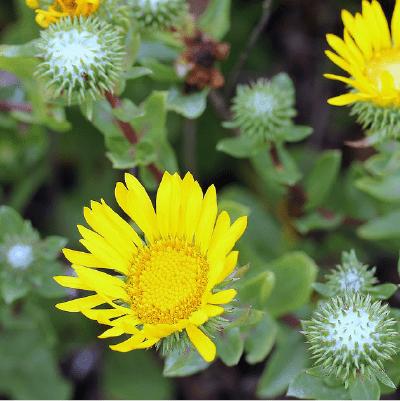
Favorite native plant or animal: CA Quail, I love the way they walk as their little head plumes bop around
Favorite thing to do around the Bay Area: CA Bay Laurel, the leaves smell amazing
Superpower: Immortality, there is so much to see and do in this world, and I would probably try a lot of things if I didn’t have to worry about dying 😎
Hillary is an administrative generalist with a wide range of professional experience. She’s had many fun and interesting jobs, including harvesting walnuts, running a woodshop, and sculpting giant props for parade floats, but especially enjoys work that benefits her community in some way. When not working, she spends time gardening, cooking, working on crafts or repair projects, and seeing live music.
Highway 37 will soon be underwater. The highway’s redesign, if done correctly, offers an opportunity to build climate-resilient infrastructure and restore 20,000 acres of wetlands.
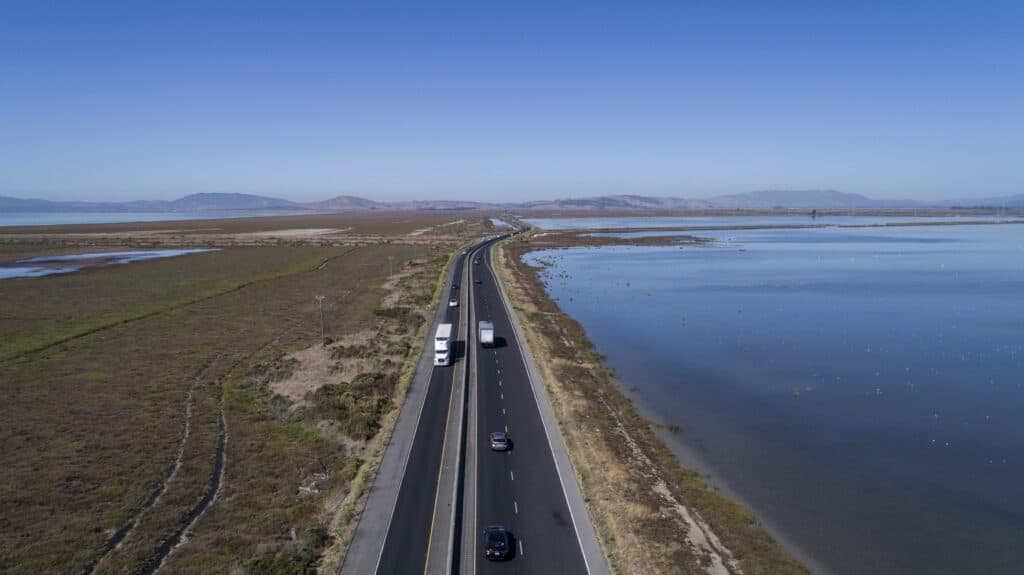
Highway 37 sits on a levee in San Pablo Bay in the north Bay Area. In 2017, the highway was shut down for a month due to flooding caused by a combination of King Tides and winter storms. During the atmospheric rivers in January 2023, the highway was again closed for a weekend when it flooded due to Novato Creek overflowing. These closures will likely happen again and again as sea levels rise if no action is taken. This would disrupt 40,000 daily car trips which people depend on to get them to jobs in Marin, Sonoma, Napa and Solano Counties. Additionally, the levee that the highway sits on currently blocks natural tide flow from San Pablo Bay to wetlands on the north side of the highway.
The redesign of Highway 37 is currently in the early planning stages. One of the proposed designs is to build the highway on an elevated causeway. This would put the highway above the reach of rising sea levels while also letting water ebb and flow with natural tidal action between San Pablo Bay and the wetlands beyond the highway. Once these 20,000 acres of wetlands are reconnected with the natural flow of tides, they can be restored to their full function, providing habitat, carbon sequestration, and flood resilience benefits.

Photo: Sonoma Land Trust
SR 37 Baylands Group (Audubon California, California Department of Fish and Wildlife, Ducks Unlimited Inc., Marin Audubon, Marin Conservation League, Point Blue Conservation Science, San Francisco Bay Joint Venture, San Francisco Bay Regional Water Quality Control Board,. San Francisco Estuary Institute,. San Pablo Bay National Wildlife Refuge, U.S. Fish and Wildlife Service, Save The Bay, Sonoma Land Trust,. State Coastal Conservancy)
Groundwater and sea level rise threaten vulnerable communities by displacing toxic contamination.
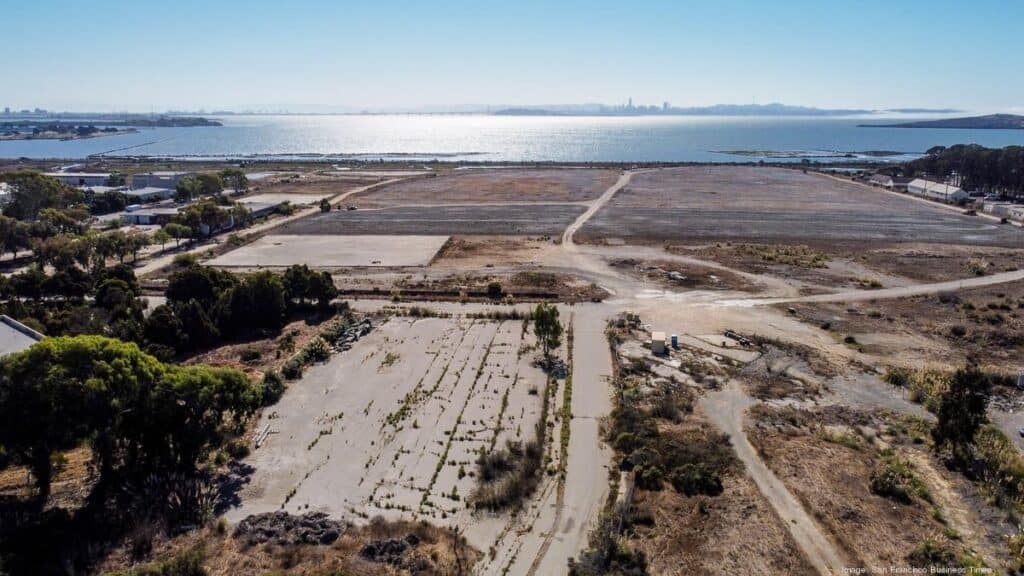
The AstraZeneca site on the Richmond shoreline was once the site of sulfuric acid, pesticide, and fertilizer manufacturing. Because of this industrial pollution, it is now contaminated with high levels of toxins such as benzene, lead, arsenic, uranium, and pesticides like DDT. So far, cleanup efforts have included leaving contaminated soil on site and “capping” it by placing concrete on top. The City of Richmond has plans to build up to 4,000 housing units on top of this contaminated land. However, as sea levels rise, groundwater will also be pushed up to the surface, potentially pushing the toxins into pipes and through cracked concrete, putting the health of residents and surrounding communities at risk.
For decades, frontline community members in Richmond have been raising awareness about the health and environmental threats posed by groundwater and sea level rise displacing toxic contaminants on industrial sites. Because of a long history of racist policies, the communities surrounding these sites are largely low-income communities of color. They are advocating for full cleanup of the AstraZeneca site before any housing is built on it, rather than simply capping contamination in place. This would involve removing all contamination from the site and taking it to a safer storage or treatment site. The Department of Toxic Substances Control (DTSC), which oversees cleanup of the site, should require AstraZeneca to conduct a full cleanup. Additionally, groundwater and sea level rise should be considered in all toxic site cleanup efforts.
Richmond Shoreline Alliance (Sunflower Alliance, Greenaction, Sierra Club, CESP, Point Molate Alliance, Richmond Progressive Alliance)
Of all the counties in California, San Mateo County is the most vulnerable to sea level rise.
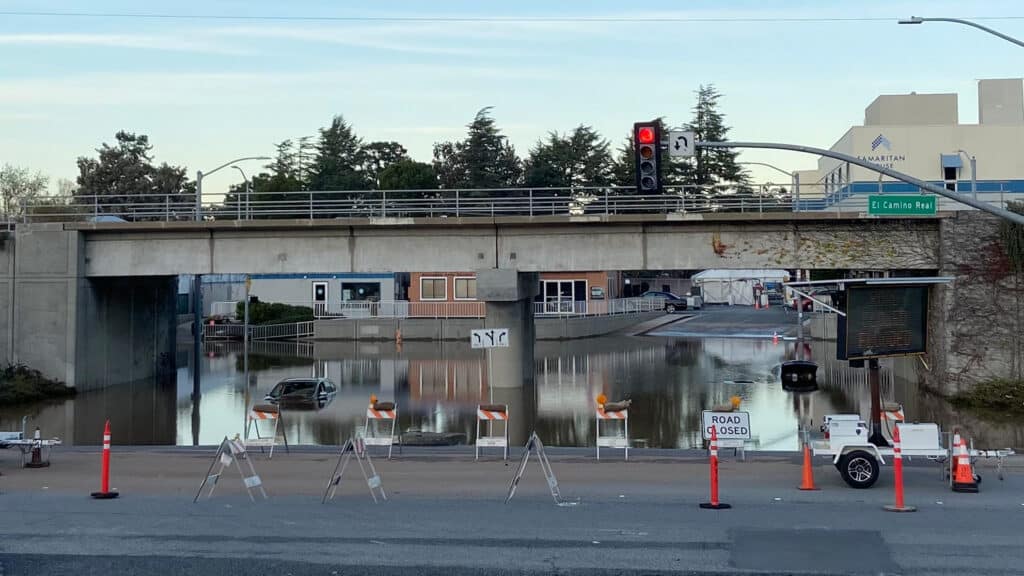
Sea Level Rise
Sea levels could rise by up to 3.3 feet in San Mateo County by 2070 and 6 feet by 2100 according to the county’s Sea Level Rise Vulnerability Assessment. While the whole Bay Area will experience rising seas, San Mateo County is particularly vulnerable, with over 30,000 homes, dozens of schools and hospitals, and over 7,000 acres of wetlands at risk of flooding by 2070. Historically underinvested communities will be the most at risk when flooding occurs because historic inequities placed affordable housing in higher flood risk areas and because they are more vulnerable to economic damages incurred.
Inland Flooding
Not all flooding happens at the coast. As storms and groundwater rise become more extreme, Bay Area communities will continue to be impacted by flooded streets and homes due to outdated stormwater infrastructure. Additionally, urban areas are primarily covered in concrete, asphalt, and other surfaces that don’t allow water to seep through. This means that during storms, rainwater runs off these surfaces picking up pollutants (like motor oil, chemicals, and trash) on its way to creeks and the Bay.
Sea Level Rise
Preparing the county for sea level rise will require a coordinated effort among cities to plan and implement solutions such as wetland restoration, horizontal levees, and sea walls. San Mateo County has taken steps in this direction with the creation of OneShoreline, a government agency that works across jurisdictional boundaries to plan and implement sea level rise resilience measures in the county. The County also conducted a countywide Sea Level Rise Vulnerability Assessment to identify areas that will be impacted by flooding and erosion and provide solutions.
This coordinated effort should be replicated across the Bay Area. Cooperation between cities and counties throughout the Bay Area is necessary to ensure that shoreline protection in one area doesn’t result in greater flooding in others. This could happen, for example, when a sea wall in one city deflects storm surges towards an adjacent city without flood protections. There should also be coordination at the state and federal level to provide funding to low-income cities that may not otherwise have resources for sea level rise planning. The San Francisco Bay Conservation and Development Commission (BCDC) is currently creating guidelines to shape local sea level rise plans.
Inland Flooding
Cities must invest in updated stormwater infrastructure to reduce flooding and capture and clean stormwater before it reaches our waterways. In particular, green stormwater infrastructure (GSI) uses natural systems like vegetation, soil, and permeable surfaces to capture stormwater and filter out pollutants. Examples include rain gardens, bioswales, and tree wells. When cities upgrade streets, parks, and other infrastructure, they could be incorporating GSI at the same time, making these new investments more flood resilient. San Mateo County is supporting this kind of integrated planning with their Sustainable Streets Master Plan.
OneShoreline, County of San Mateo
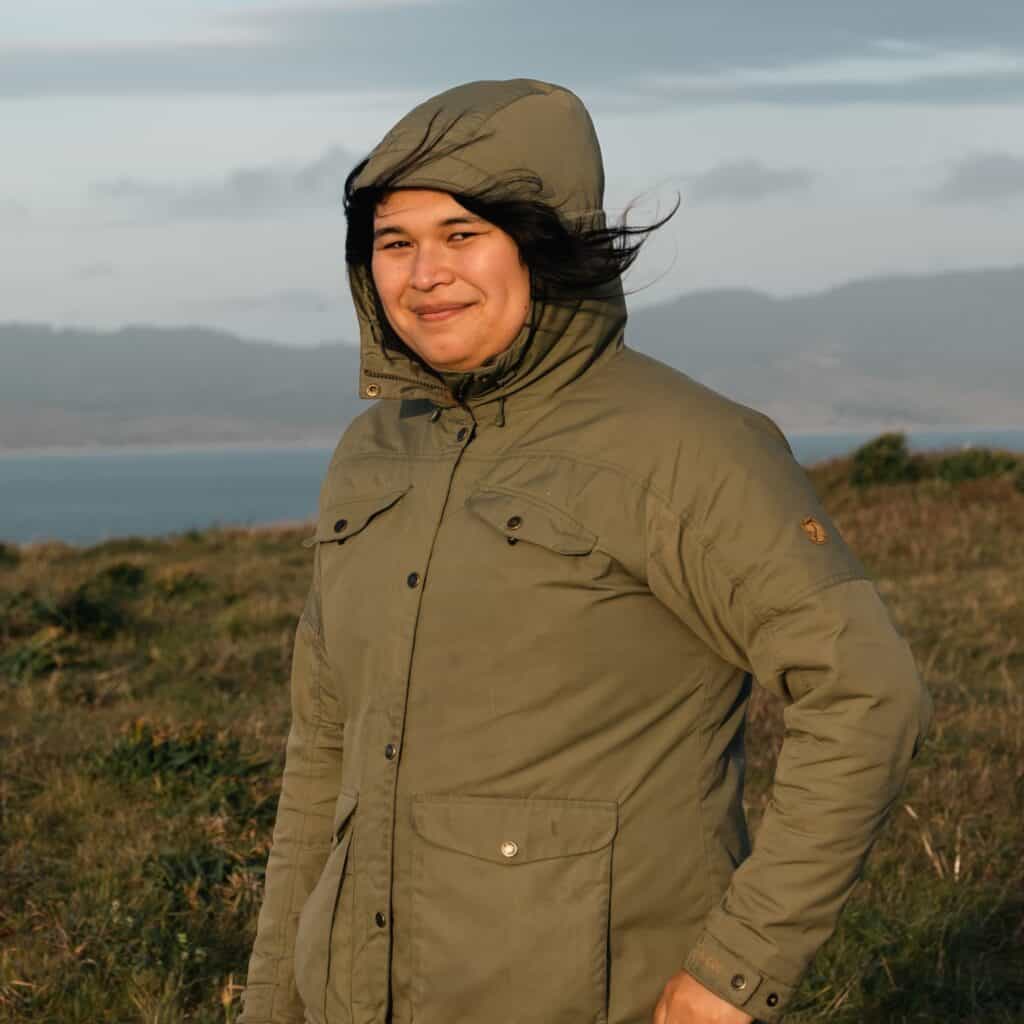
Favorite native plant or animal: Western maidenhair fern
Favorite thing to do around the Bay Area: Jam at the beach!
Superpower: Shape Shifting
Haymar (she/they) grew up bicoastally in California and New York. Her love for estuaries and environmental justice began in high school with her involvement with the Village Community Boathouse, an organization providing free public rowing and estuary education in New York Harbor. Haymar’s work at McGill University, the Waquoit Bay National Estuarine Research Reserve, the Yurok Tribe Environmental Program and Richardson Bay Audubon has brought her to Save The Bay with a deep sense of purpose to serve the most vulnerable, be they wildlife or human. Her hobbies include photography, songwriting, knitting, rock climbing, hiking and generally existing outdoors.

Favorite native plant or animal: Yarrow and Sitcky monkey-flower but I love anything that smells amazing, like Mugwort and White Pitcher Sage. There are too many to pick!
Favorite thing to do around the Bay Area: Going to new eateries! I love trying new foods and all different kinds of cuisines! Food has always been an important part of my culture and upbringing. The Bay Area is really special in that way, there is so much culture and diversity.
Superpower: Teleportation! That way I could visit my hometown in LA often while doing life in the Bay (and travel all over the world).
Daniella (she/her) is a first-generation Latinx, born and raised in LA. She graduated from Davis with a B.S. in Environmental Policy Analysis and Planning and an emphasis in Conservation Management. Daniella is extremely passionate about working in the field of environmental education and restoration, specifically making it an accessible and inclusive space for all! Coming from the STRAW program at Point Blue, Daniella has experience in transition zone, tidal marsh, and riparian restoration with kiddos. She looks forward to collaborating with more communities throughout the Bay Area. Daniella’s hobbies include: reading, eating new food, breweries, music (especially festivals and shows), rewatching New Girl and then doing it again, and loving on her cat.

Favorite native plant or animal: Sky Lupine
Favorite thing to do around the Bay Area: Reading a book outdoors and spending time among redwoods
Superpower: Telekinesis
Having grown up in the Bay Area, Erin is excited to join Save The Bay and work towards equitable climate policies for the region. Her previous experience includes advocating for renewable energy policy at Environment New Mexico and working on California local government outreach and engagement programs at SGA Marketing. Outside of work, she enjoys reading, painting, and being outdoors.

Favorite native plant or animal:
Silver lupine (Lupinus albifrons)
Favorite thing to do around the Bay Area:
Play with my dog and everyone else’s dog at Point Isabel
Superpower:
The ability to speak and understand all languages
Leslie is the Individual Giving Officer at Save The Bay and is proud to support building climate resiliency in the place she calls home. Prior to joining us, Leslie spent seven years engaging the vibrant Oakland and Bay Area community through visitor experience and membership at the Oakland Museum of California. In her downtime, you can find her arranging florals and getting muddy with her family and dog, Moose.

Favorite native plant or animal:
Redwoods
Favorite thing to do around the Bay Area:
Bike through Tilden Regional Park
Superpower:
End climate change and rebuild resilient ecosystems
Hayley is a Save The Bay Policy Manager focused on equitable climate resilience. She focuses on multi-benefit green infrastructure, ensuring our region’s land use planning is addressing the impacts of climate change. Before joining Save The Bay’s team, she worked on land use planning policy advocacy related to transportation, housing, open space, and agriculture at Greenbelt Alliance and TransForm. She is passionate about deconstructing systems of oppression and ensuring our land and water ecosystems are healthy and abundant. She has a master’s in Environmental Policy and Planning and Environmental Justice from the University of Michigan School for Environment and Sustainability. When not advocating, Hayley can be found puttering in her garden or swimming in alpine lakes.

Favorite native plant or animal:
Harbor Porpoise – a recovery story directly in line with Save The Bay’s work! Better water quality is one of the contributing factors.
Favorite thing to do around the Bay Area:
Spotting birds while swimming in the Bay
Superpower:
Being a Babel Fish – able to understand the communication of all beings
Masha is a strategic leader, fundraiser, and storyteller whose experience was forged building successful community-based initiatives. She is passionate about working with people to put their values into action. Born in the Soviet Union, Masha came to the United States as a refugee. Prior to Save The Bay, her career was mainly in human services, particularly fundraising for refugee resettlement and community-building led by and for former refugees. She is a Certified California Naturalist, a Master Birder in training, and enjoys swimming in, birding on and around, and rowing on the Bay.

Favorite native plant or animal: Giant trillium
Favorite thing to do in the Bay Area: Walking among redwoods
Superpower:
Teleporting back 300 years to fly over California—from the Bay’s untouched marshes to the Sierra’s waterfalls, rivers, and wildflower-filled forests-free of freeways, building, and dams
Chirag has lived in San Jose for three decades and, like fellow members of Save The Bay, holds deep appreciation for San Francisco Bay.
She began her career in the tech sector before pivoting in the last decade to sustainability and social impact initiatives focused on water resilience, climate action, labor rights, and disability inclusion. She joined Save The Bay to support the protection and restoration of the Bay’s wetlands through nature-based solutions, which are essential for building resilience to the impacts of climate change.

Favorite native plant or animal:
Valley Oaks—my first memory of Northern California is their dusty green canopies on golden hillsides. Now, I’m lucky to live among them, with hawks soaring overhead.
Favorite thing to do around the Bay Area:
Hiking through the hills and along the Bay, taking in the views from above.
Superpower:
Levitation—the ability to calmly lift my arms to the sky and float, soaring effortlessly through the air
Dennis is a retired partner from Fenwick & West, where he provided strategic legal and business advice to startups and publicly traded companies.
A long-time Bay Area resident, he is committed to addressing climate change and environmental inequities through the restoration and preservation of the Bay and surrounding environment. He has served on the boards of Peninsula Open Space Trust and PIE Ranch, as well as the Advisory Council for Stanford’s Jasper Ridge Biological Preserve.
Dennis and his wife are avid hikers and passionate about exploring the regions culture and cuisine.

Favorite native plant or animal: Coyote
Favorite thing to do in the Bay Area: Hiking in the redwoods with a view of the Bay
Superpower: Communicating with animals
Terry is a scientist dedicated to environmental protection, most recently serving as Chair of the San Francisco Regional Water Quality Control Board.
Her career has included advising Bay Area environmental groups and serving on U.S. EPA’s Science Advisory Board. She values Save The Bay’s focus on nature-based solutions to address climate change and new-generation chemical pollution.
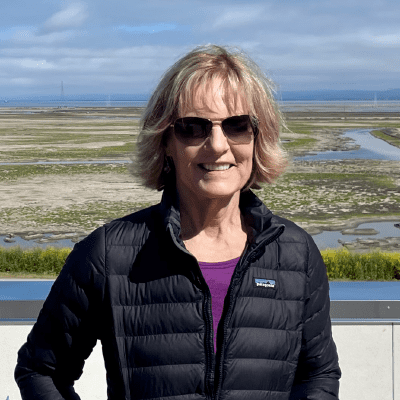
Favorite native plant or animal: Gray Fox—the adorable resident of the Baylands
Favorite thing to do in the Bay Area: Biking along the Bay Trail or walking at Palo Alto Baylands Nature Preserve—but nothing beats a sunset sail near the Golden Gate Bridge
Superpower: Healing—what could be more incredible than the power to heal
Lauren is a Bay Area native who began her career as a journalist for Sunset Magazine, covering sustainable gardening and landscape design.
Her passion for green building and sustainable development led her to Meta, where she collaborated with internationally acclaimed architects to create environmentally responsible, resource-efficient buildings. During that time, she also partnered with local and regional nonprofits, including Save The Bay, to help protect and restore wetlands and endangered species adjacent to Meta’s headquarters.
Lauren also serves on the Advisory Council for Canopy and Ecumenical Hunger Program.

Jay Pierrepont is a Principle and the President/COO of Asset Management of Equilibrium, a firm with sustainability at its core. Originally from New York, he settled in San Francisco where you might find him acing sailing lessons.

Favorite native plant or animal:
Lupine (good in nature and hopefully the home garden too)
Favorite thing to do around the Bay Area:
Anything close to the water! Hiking, sailing, or anything outdoors
Superpower:
Predicting the Bay Area weather? Or teleportation, it would make commuting a lot easier
Hugh Le is a Partner at PricewaterhouseCoopers (PwC) Strategy&, focusing on corporate strategy and energy transition. He helps companies address climate resiliency, sustainability, and enterprise transformations. He is passionate about protecting our Bay and bringing together solutions across business, policy, education, and individual change. He is serving Save The Bay so that our Bay can be enjoyed by future generations.

Favorite native plant or animal: California poppy – I love the vibrant color!
Favorite thing to do in the Bay Area: Hike
Superpower: Instantly transport myself to anyplace in the world
Yoon is a Principal in PricewaterhouseCoopers’ Sustainability Practice, where she helps companies identify and quantify climate and nature-related risks and opportunities to inform strategic decision-making and bolster resilience and sustainability.
She joined Save the Bay’s Board of Directors to combine her passion for catalyzing climate change adaptation with her love for the diverse, rich ecosystems of the San Francisco Bay Area.

Favorite native plant or animal:
Bobcat
Favorite thing to do around the Bay Area:
Sailing on Save The Bay’s annual catamaran excursion
Superpower:
Time travel
Chris is a retired partner in Davis Polk’s Northern California office, where he focused on complex litigation and strategic problem solving for leading businesses. He currently serves as a mediator and arbitrator in business disputes, and teaches negotiations and advanced antitrust courses at Berkeley Law and University of Virginia.
Chris has been involved in conservation and environmental causes for over 20 years, and loves spending time on the Bay and shoreline.
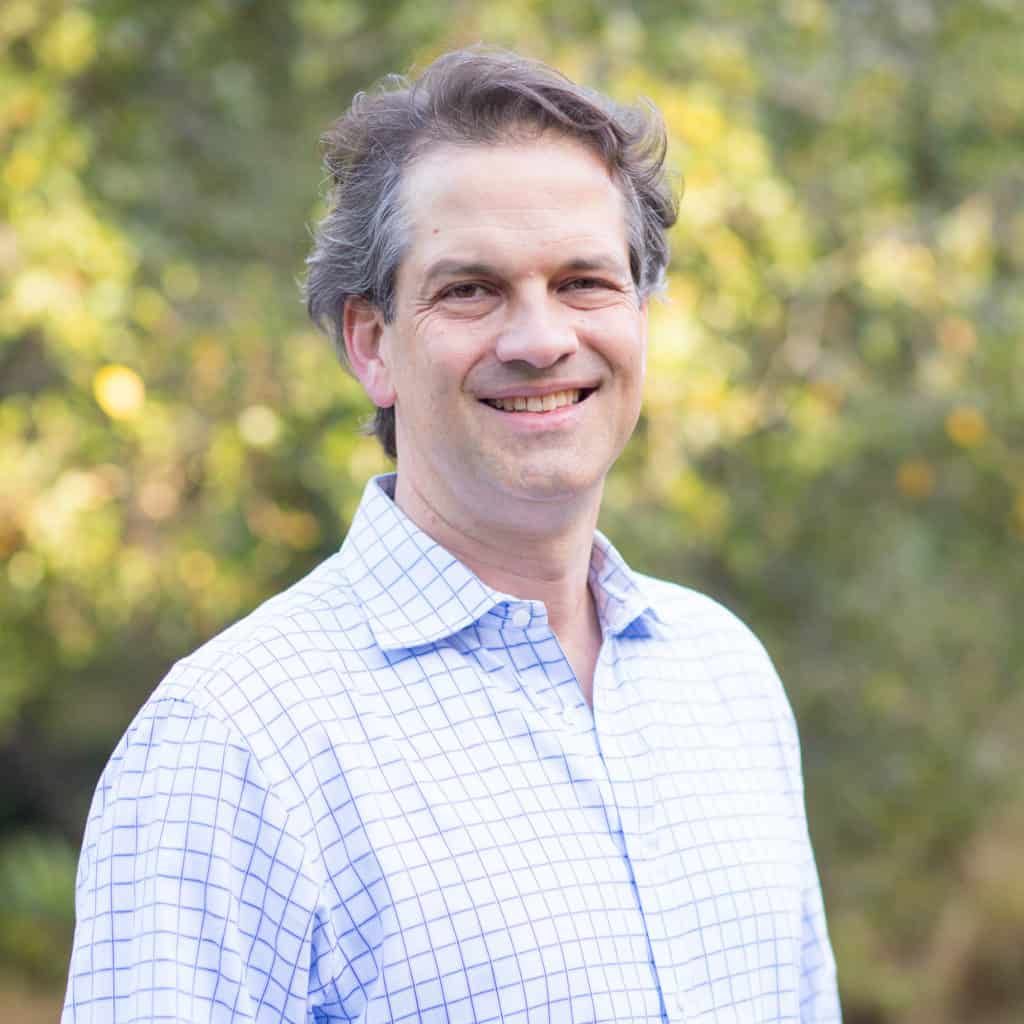
Donnie joined the Board of Save The Bay in 2011 after working on a successful campaign to defeat California’s Prop 23, which would have overturned California’s climate and clean energy laws. Fowler regularly braves the annual Escape from Alcatraz Triathlon. He asks, “How lucky are Bay Area residents to be able to experience all this in our backyard?”
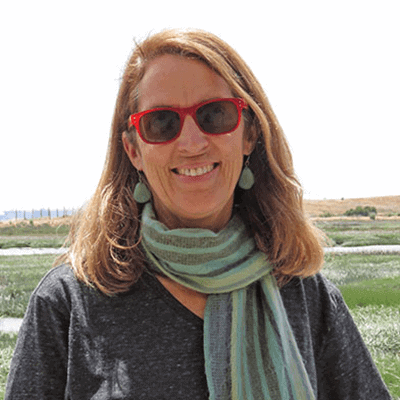
Favorite native plant or animal: California Quail
Favorite thing to do in the Bay Area: Being within sight, sound, or scent of the Bay—especially when sailing, kayaking, or treading water
Superpower: To solve problems and enhance lives through design and dialogue
Nancy is a San Francisco native who returned to her hometown after earning a PhD in Art History from Columbia University. She has taught architectural history at Mills College, UC Davis, and other institutions, fostering a deep appreciation for the region’s rich history.
She is dedicated to ensuring that people of all backgrounds and from across the Bay Area can experience and enjoy the beauty of the Bay.

Favorite native plant or animal: Burrowing Owl
Favorite thing to do in the Bay Area: Riding my bike, birding and taking photos
Superpower: Converting micro plastics into sustainable transportation
Steve is a Bay Area native whose love of hiking and cycling has deepened his appreciation for the region’s natural beauty.
As a Director of Engineering at Adobe, he focuses on building solutions that benefit everyone. He joined Save The Bay’s Board of Directors to combine his passion for the environment and the Bay Area with his technical expertise, to help preserve the beauty of the San Francisco Bay for all to enjoy.
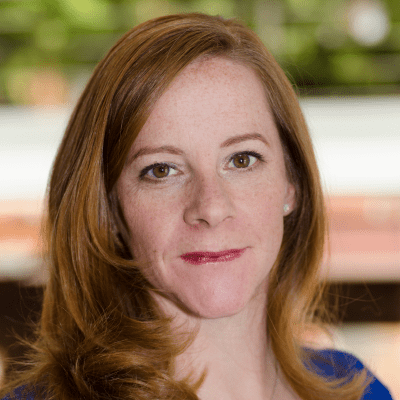
Favorite native plant or animal: Sticky Monkey Flower
Favorite thing to do around the Bay Area: Explore new hiking trails in all nine Bay Area counties with my dog, Klondike
Superpower: Control the Weather
Gwendolyn’s passion for mission-driven work is everlasting. She is a visionary, where strategy, creativity and passion are the hallmarks of her 25-year career in fundraising and communications. She values and invests in building a collaborative team environment that develops farseeing strategies, effective organizational structures, and impactful results. In her spare time, mountain trails and ridge lines are where she roams with her family and their dog, Klondike.
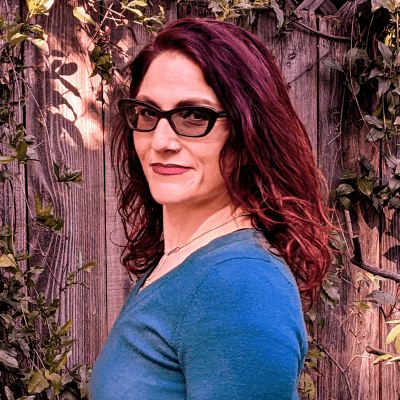
Favorite native plant or animal:
The golden poppy
Favorite thing to do around the Bay Area:
Ride the ferry from the East Bay to San Francisco or Marin
Superpower:
Teleporting
Amy Stoddard’s career has been anchored in the nonprofit sector since 2004, with a focus on fundraising and a specialization in grant writing/management. She joined Save The Bay in 2019, where she guides fund development via foundations/corporate partners. Prior, she managed grants at Planned Parenthood Northern California for four years. She holds a Bachelor’s Degree from UC Santa Cruz in Community Studies, with a minor in Literature.
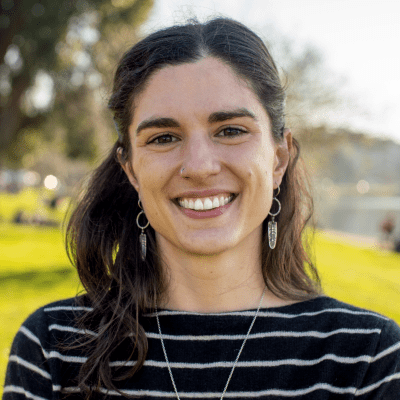
Favorite native plant or animal:
Sticky Monkey Flower (Diplacus aurantiacus)
Favorite thing to do around the Bay Area:
Rock climb and mountain bike on the East Bay trails
Superpower:
The ability to snap my fingers and be anywhere
Melody is a communications professional with more than a decade of experience working for environmental nonprofits. She moved to the Bay Area from Arcata, CA for college and has been here ever since. In her spare time, she can be found exploring hiking trails and climbing spots near and far. She earned a B.A. in US History from the University of California, Berkeley and resides in Oakland with two friendly rescue cats and a rapidly expanding indoor jungle.

Favorite native plant or animal:
When the poppies are blooming
Favorite thing to do around the Bay Area:
Hiking and taking advantage of the variety of landscapes around the Bay Area
Superpower:
Shapeshifting! You could be a bird one day and a sea lion another
Josh is the Policy Manager for Save The Bay working to secure funding to restore Bay wetlands and enact regulations to restrict pollution and promote climate adaptation. Prior to joining Save The Bay, Josh worked as a federal legislative staffer for both the U.S. Senate and House of Representatives.
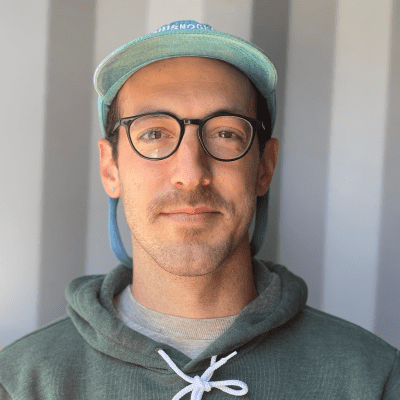
GianCarlo “Charlie” Onorati was born and raised in LA and grew up exploring the Santa Monica Mountains. In 2014 he moved to the Bay Area in 2014 to teach at San Mateo Outdoor Education and has stayed in the Bay ever since. He has worked in youth development and environmental education all over California and loves to bring students out to the shoreline to explore their connection and build a sense of responsibility. Charlie likes to return to the redwoods frequently and hike and explore all over the region.
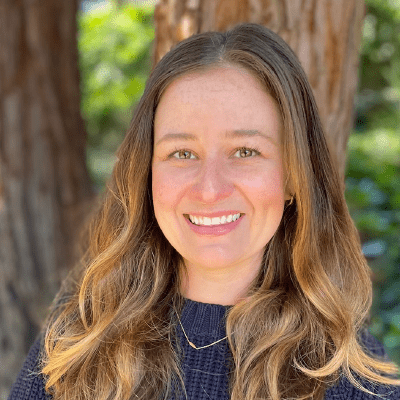
Favorite native plant or animal:
Valley oak (Quercus lobata)
Favorite thing to do around the Bay Area:
Hike to earn stunning views and spot seasonal wildflowers
Superpower:
Time travel – specifically to go back in time and view the Bay landscapes throughout history
Jessie Olson is Save The Bay’s Habitat Restoration Director. In nearly eight years at Save The Bay, she built our diverse set of native plant nurseries to support new, larger transition zone habitat restoration projects on the shoreline. We’ve propagated and installed more than 300,000 native plants under her leadership. Jessie brings over 13 years of experience working in natural resource management, habitat restoration, and project implementation to the organization.

Favorite native plant or animal:
Anna’s Hummingbird and Toxicodendron diversilobum
Favorite thing to do around the Bay Area:
Hike
Superpower:
The ability to fly
Erica is a lifelong resident of the Bay Area. Her career path has consisted of honing accounting, office administration and management skills in different iterations for about 15 years. She spends her free time with friends, enjoying local restaurants, watching bands, and exploring nature. She feels lucky to work for an organization that is so closely aligned with her deepest intentions to protect and repair our beautiful Bay.

Favorite native plant or animal:
Mountain lion
Favorite thing to do around the Bay Area:
Jumping in the water
Superpower:
The ability to fly
Jesse is the Restoration Program Manager at Save the Bay. She comes from a background in conservation education and people operations and has a passion for building connections between people and place. She is drawn to shoreline ecosystems because of the complexities of these habitats and the need for collaborative human engagement to protect and restore these systems. Some of her favorite parts of a workday include witnessing native seedlings emerge from the soil and hearing students share what they think of when they picture the San Francisco Bay.

Favorite native plant or animal:
Matilija Poppy (Romneya coulteri)
Favorite thing to do around the Bay Area:
Outdoor concerts
Superpower:
Teleportation
Delanie is a visual communications designer with experience in marketing and development in-house for non-profit, scientific, and environmental institutions. She specializes in graphic design, video production, branding, and content strategy. Outside of work she enjoys running, hiking, and crafting.
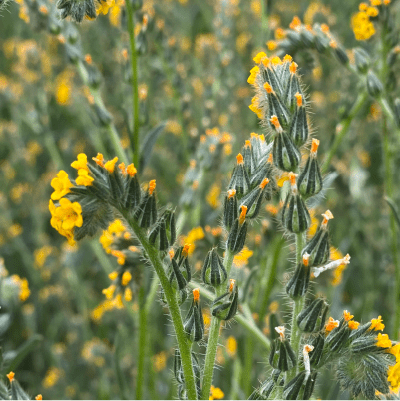
Favorite native plant or animal:
California Brown Pelican
Favorite thing to do around the Bay Area:
Exercising outdoors and taking advantage of the great year round weather, playing pickup basketball at local parks like San Pablo Park, and running/biking through the East Bay out to the end of the Emeryville Marina
Superpower:
The ability to fly
Henry was born in Cleveland, Ohio, but spent the majority of his childhood in Washington, DC. He attended Skidmore College and majored in Environmental Studies, discovering his passion for environmental research while studying abroad in Panama. Prior to joining Save The Bay, Henry worked in the workforce development field, primarily developing and expanding programs supporting individuals with barriers to employment.
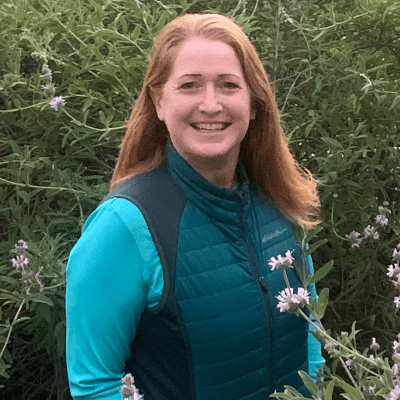
Favorite native plant or animal:
California newt
Favorite thing to do around the Bay Area:
Long bike rides along the shoreline and across bridges
Superpower:
Time travel
Robin has worked in the nonprofit sector for 25 years with a focus on finance and human resources. She received a B.A. in International Relations and Japanese from UC Davis and recently finished a five year term on the Board of Directors for Diabetes Youth Families. Out in the wild you’re likely to find Robin hiking, biking, paddle boarding, or gardening with her son.
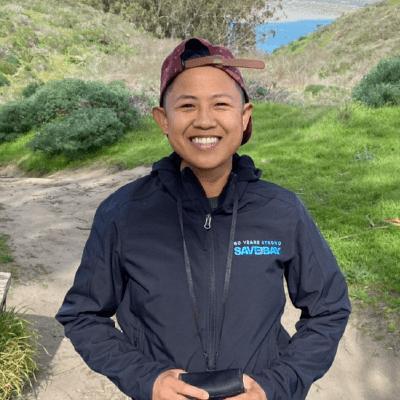
Favorite native plant or animal:
Yarrow
Favorite thing to do around the Bay Area:
Hike around Redwood Regional park
Superpower:
Astral Phasing
Gem is Save The Bay’s Operations Manager. They were born & raised in the island of Guåhan, but moved to the Bay Area in 2015 and has been living on Ohlone land ever since. Outside of Save The Bay, Gem enjoys playing guitar and percussion with their band, Coraza, and has a deep love for being involved with Bay Area organizations that focus on Queer and Trans liberation and the Arts, including API Equality of Northern California (APIENC) and Kearny Street Workshop.

Favorite native plant or animal:
California sagebrush
Favorite thing to do around the Bay Area:
Walk along the levees at Eden Landing and enjoy the views from Angel Island
Superpower:
Fly
Allison is the Political Director at Save The Bay, where she works to advance equitable climate adaptation, sustainable development, and Bay health through policy and advocacy. Prior to Save The Bay, Allison worked for the Ocean Foundation’s Coastal Ocean Values Center, developing economic indicators of ecosystem health in Santa Monica Bay, Morro Bay, and Elkhorn Slough. Allison has a Master’s degree in Environmental Science and Management from the Bren School at UC Santa Barbara.
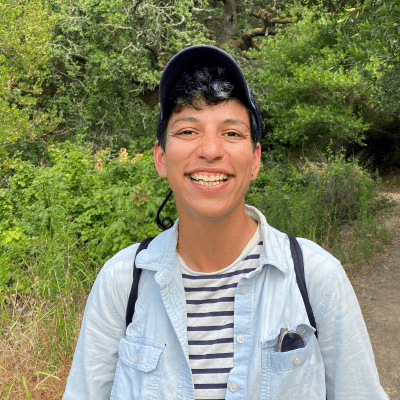
Millie brings a wealth of experience working with native plants from seed collection to habitat restoration in the field, including work with the Golden Gate National Parks Conservancy in overseeing seed collection of over 50 native species in the Presidio. Millie is a Certified UC Climate Steward and is passionate about engaging members of the public to realize their own power and role in combatting climate change. We’re excited for them to bring their science communication and volunteer management skills to our team.
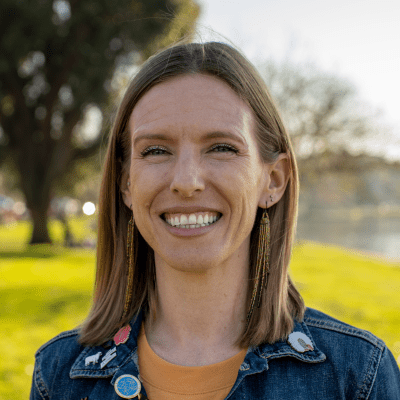
Bio coming soon
